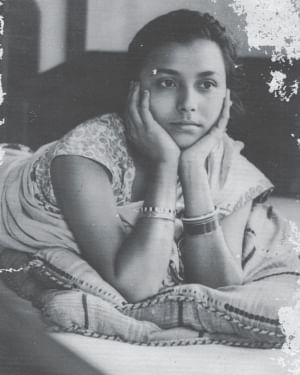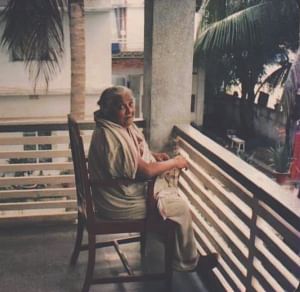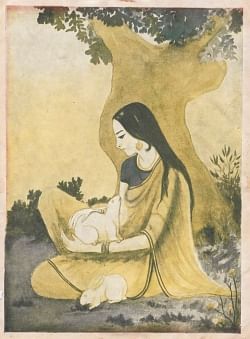| Home - Back Issues - The Team - Contact Us |
 |
| Volume 11 |Issue 46| November 23, 2012 | |
|
|
Reflections The Little Girl
Who Never
Grew Up Hasina Iqbal
From her very childhood, my mother was a lover of arts. She liked to draw, write poems, and also sing. In her very early years, she was often found with her brush and colours occupying a corner of the veranda on lazy afternoons, where one after another lovely paintings used to pile up beside her. Sometimes her elder brother Habib (Habib Rahman, who himself grew up to be a great photographer and a leading architect of India) would often help her with ideas. As for music, she was such a music lover that at her wedding her eldest brother Obaid arranged the renowned Indian singer Krishna Chandra Dey (uncle of Manna Dey) to sing all night long at their Calcutta residence. Her brother Habib presented her a harmonium on her wedding which she treasured all through her life. I still faintly remember her singing "Olo Shephali" or "Akashe pakhi kohichhe gahi" accompanied by the harmonium whenever she got time. Even in her old age, whether she was cooking or doing household chores, she was always singing a line or two of her favourite songs. After marriage, the spare time she got after rearing her children, she spent mostly on painting. Her husband late Quazi Mukhlesur Rahman, who himself was a great connoisseur of art and classical music, gave her full support in all her artistic pursuits. Some of Asghari's paintings were published in the then famous monthly Saugat, and the Mahe Nau. She was a self-taught artist; there were huge collections of her art work, but unfortunately many were lost, some destroyed by time, some misplaced when moving from India to the then East Pakistan. Some were mysteriously stolen from a nursing home in Kolkata where she was recovering form illness. As she told us, recuperating there, she had utilised her time by giving finishing recuperating touches to her paintings. It so happened that one of the in-charges, told her that her mother my grandmother had sent a person asking her to hand over some of her paintings to him which would be hung in their house. In good faith, she picked out the most beautiful ones she had drawn and handed them over. When after recovery, she returned home, she was devastated to discover that her mother had not at all asked for her paintings. She realised that she had been cheated and her paintings were gone for ever. Whether the matter was pursued or not she never told us. But she would often lament that among the lost paintings was the most beautiful one of her life she thought she had painted. She told us that it was a painting of seven sisters each wearing a sari in one of the seven rainbow colours watching the beautiful rainbow in the rain-washed sky. All through our life, this painting remained only in her memory and in our imagination. She gave up painting in her middle age because of failing health. The last unfinished painting of hers I can remember was that of a rural bride peeping out of the window of her palanquin window rested under a huge banyan tree, while her younger brother played the flute, waiting for the "beharas" or "palquin" bearers return after having their meal. That incomplete painting of hers evoked sad memories as it seemed to be an epitaph to her artistic career. There was another done in black and white of a lonely "musafir" or traveller sitting helplessly near the bank of a river waiting for a boat with thick, black clouds gathering in the sky. In spite of giving up painting, she remained a true artist at heart. When my elder sister and I took up painting, she remained our real guru and the greatest connoisseur of our art. She would advise us, when we painted the leaves and the grass, never to use pure green, but to mix yellow and black , or mix green with a little bit of brown which would give a more realistic touch. She would dab and rub her finger on the wet black surface to show us the true effect of clouds or the curly hair of a girl. In her late age, she again felt like doing some art work, but painting became quite difficult then, so she would ask for small pieces of wood from the carpenter who worked at our house, and would paste sea shells, plastic flowers and leaves, tamarind seeds, or anything she found to create her own collages, so to say. When we moved to our house in Dhanmondi Dhaka, and she was approaching her old age, she made it a routine practice of relaxing on a chair every evening in our south veranda to watch the greenery which still existed in the surroundings and to hear the birds tweeting in the nearby trees. She was the bird watcher of our family, because it was she who observed all kinds of birds arriving and leaving along with the seasonal changes. When the first sound of the Cuckoo was heard, she would exclaim with joy, "Spring is here! Spring is here!"
Open spaces fascinated her, so much so that when our house was being built she made a request that the house should be surrounded with verandas on all sides and there should be huge balconies as well. In fact she used to tell us, "I admire Rabindranath, whose idea it was that we should stay in open spaces most of the time; the house is mainly for shelter". When my children would engage in "chorui bhati"or picnic in our backyard with their friends, she made it sure that her share of food was served on banana leaves for the full natural feeling. She was a great animal lover as well. Every evening, she sat in the veranda, with her favourite cat cuddled on her lap. She tried not to get up even if she had to, lest she woke her dear cat up. In her later age, strangely enough, she would not let us kill even a cockroach, let alone mice and other pests, as she thought every creature had the right to live. Perhaps she echoed those lines of Shakespeare from "Measure for Measure" "And the poor beetle ,/that we tread upon ,/In corporal sufferance finds a pang as great/ As when a giant dies." She was so fond of animal and jungle movies that when she found none of us to accompany her, she would drag her cousin to the shows. I still remember how excited she returned after watching films like Drums of Destiny, Hatari and so on. My brother brought many videos on animals from abroad, but by the time she got to see them she was almost blind. Whenever there was any film of Suchitra Uttam pair, she would move close to the TV set just to hear the voice of her favourite duo. It broke our hearts to see that in her later years the beautiful world that she saw with her beautiful wide eyes, which she portrayed so fondly in her art, was gradually fading away from her. The name of my beloved mother was Asghari Begum, known as""Alli" to her close ones as that was how she uttered her name while she had just begun to talk. Asghari, in Arabic means "little girl "; and she indeed was as naive and innocent as a child. She truly remained the little girl who never grew up.
|
||||||||||||
|


